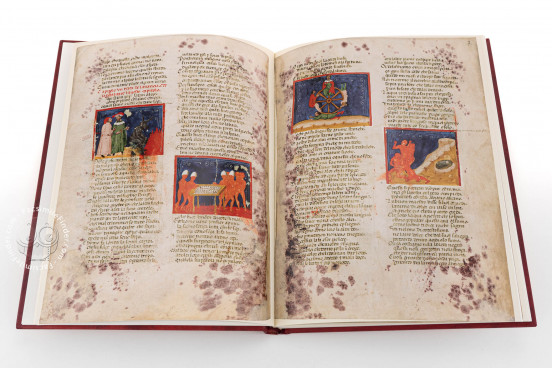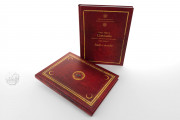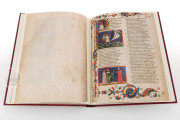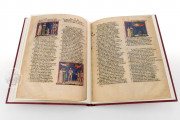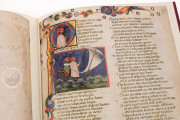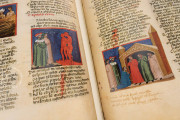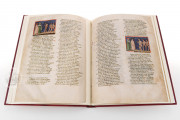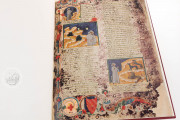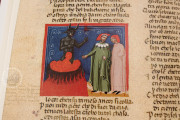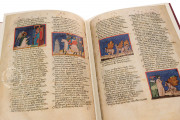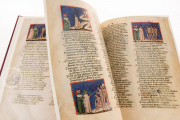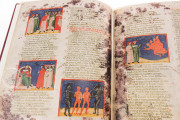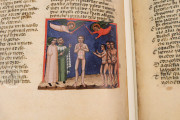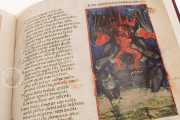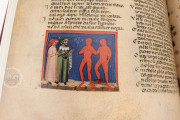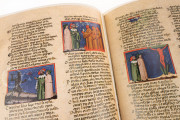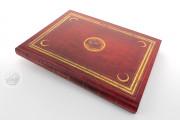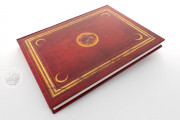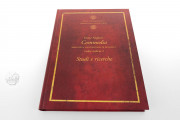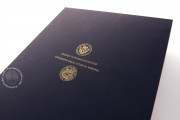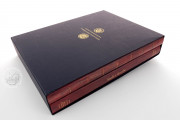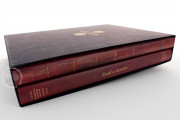The Budapest Manuscript is an early illuminated copy of a redacted version of Dante Alighieri's Divine Comedy, a long Christian moralizing poem in three parts—Inferno, Purgatorio, and Paradiso. Created in Venice in the mid-fourteenth century for a member of the Emo family, it boasts ninety-four completed column miniatures and three historiated initials. The refined compositions are balanced and theatrical, with rich, earthy colors and finely detailed facial expressions.
The text of Dante's poem has been thoughtfully reduced, retaining the principal narrative arc of the poet's journey through the otherworld, led first by the ancient Roman poet Virgil (70-19 BCE), then by Beatrice (a character from one of the poet's earlier works), and finally by Saint Bernard of Clairvaux (d. 1153).
Refined Elegance
The miniatures of the Budapest manuscript are characterized by their dark blue backgrounds with delicate fine line embellishment in white and painted red frames. Dante usually appears dressed in a plain pinkish robe and a red or green headdress. Virgil is more sumptuously garbed in a heavy green robe with an ermine collar. He usually wears a large, floppy cap, most often red.
The souls encountered by the travelers are often rendered in red, with fine lines indicating the details of their anatomy. This serves well to distinguish the travelers from those they encounter. Some miniatures treat themes other than the poet's journey, such as the Wheel of Fortune and the Annunciation to the Virgin (fols. 7r and 35v).
A Carefully Coordinated Project
Despite the shortened text of Dante's poem, the manuscript was an ambitious undertaking. The original plan was to include 177 miniatures. The manuscript is a valuable witness to the workings of manuscript creation in fourteenth-century Venice: traces of detailed instructions for the illuminator are preserved in the book's margins. These were imperative for ensuring the coordination of text and image.
A Scribe and His Soul
The scribe expresses his hope for his eternal soul in a colophon (fol. 78v) but does not identify himself by name. He was an urban professional who wrote the abridged Divine Comedy (fols. 1-78) and a much shorter collection of aphorisms in Latin with translations into Venetian dialect (fols. 79-81) in two columns in Gothic Rotunda.
A Book Fit for Royalty
The border extensions of the historiated initial that opens the Commedia include the coat of arms of the Emo family (fol. 1r). The manuscript seems to have stayed in the family for more than a century. It ended up in the library of Matthias I (1443-1490), King of Hungary, perhaps a gift from Giovanni Emo. It was removed to the library of the sultans of the Turks in the sixteenth century, and Abdülhamid II (1842-1918), Sultan of the Turks, donated it to the university in Budapest in 1877. The present binding of gold-tooled red leather over boards is Turkish and dates from the nineteenth century, probably 1877.
We have 1 facsimile edition of the manuscript "Divine Comedy - Budapest Manuscript": Dante Alighieri Commedia facsimile edition, published by Szegedi Tudomànyegyetem, 2006
Request Info / Price
